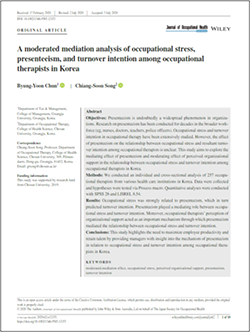#0060 A moderated mediation analysis of occupational stress, presenteeism, and turnover intention among occupational therapists in Korea

Study on Korean occupational therapists suggests that organizational support is crucial to prevent burnout
Presenteeism or putting in excess hours at the workplace can take a toll on physical and mental health. It typically stems from a feeling of job insecurity and is particularly relevant given the current global economic situation wherein several organizations are compelled to cut down costs and increase their productivity using limited staff.
This also holds true for occupational therapists (OTs) that rehabilitate injured and disabled patients through the therapeutic use of daily activities. Since they largely outnumber the positions that the healthcare sector can currently offer, those employed may experience insecurity and therefore over-work in order to retain their jobs. Occupational stress and turnover intention (intention to leave) has been previously studied in occupational therapists. But how presenteeism correlates with work related stress and employees being laid off or intending to leave remains unclear.
We therefore sought out to investigate how stress can manifest into presenteeism and turnover intention in 257 OTs across 23 health care centers in Korea; and if organizational support can make a positive change.
For, this, we analyzed data from questionnaires answered by the participants regarding job satisfaction, work environment, stress, presenteeism, intention to quit and perceived organizational support.
We found that OS can prompt OTs to work even when ill in order to project a positive and hard-working attitude. Such attempts can however decrease their productivity and satisfaction from work. Together, they may feel disconnected and experience lack of commitment towards the organization therefore contributing to turnover. Thus, presenteeism here plays a mediating role between OS and the intention to leave. Organizational support on the other hand instills a sense of value and belonging in employees and was found to weaken the association between presenteeism and the intention to quit, thereby improving productivity.
Overall, our findings suggest that support at the managerial level can help ease occupational stress in OTs and help reduce the attrition rate. This can greatly reduce the cost and effort involved in recruiting new staff for replacing the earlier trained and seasoned employees. Efforts must thus be directed towards improving organizational support to maximize employee productivity and minimize work related stress.

Link to the original journal article:
https://onlinelibrary.wiley.com/doi/full/10.1002/1348-9585.12153
Title of the paper:
A moderated mediation analysis of occupational stress, presenteeism, and turnover intention among occupational therapists in Korea
Authors:
Byung-Yoon Chun, Chiang-Soon Song




